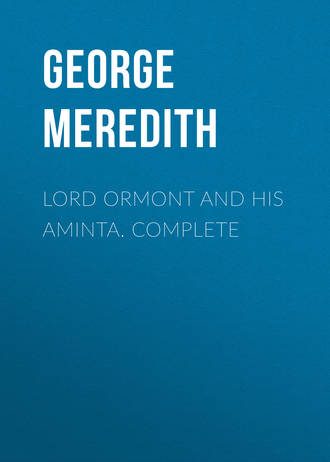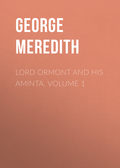
George Meredith
Lord Ormont and His Aminta. Complete
CHAPTER XXVII. A MARINE DUET
She soon had to know she was chased. She had seen the dive from the boat, and received all illumination. With a chuckle of delighted surprise, like a blackbird startled, she pushed seaward for joy of the effort, thinking she could exult in imagination of an escape up to the moment of capture, yielding then only to his greater will; and she meant to try it.
The swim was a holiday; all was new—nothing came to her as the same old thing since she took her plunge; she had a sea-mind—had left her earth-mind ashore. The swim, and Matey Weyburn pursuing her passed up, out of happiness, through the spheres of delirium, into the region where our life is as we would have it be a home holding the quiet of the heavens, if but midway thither, and a home of delicious animation of the whole frame, equal to wings.
He drew on her, but he was distant, and she waved an arm. The shout of her glee sprang from her: ‘Matey!’ He waved; she heard his voice. Was it her name? He was not so drunken of the sea as she: he had not leapt out of bondage into buoyant waters, into a youth without a blot, without an aim, satisfied in tasting; the dream of the long felicity.
A thought brushed by her: How if he were absent? It relaxed her stroke of arms and legs. He had doubled the salt sea’s rapture, and he had shackled its gift of freedom. She turned to float, gathering her knees for the funny sullen kick, until she heard him near. At once her stroke was renewed vigorously; she had the foot of her pursuer, and she called, ‘Adieu, Matey Weyburn!’
Her bravado deserved a swifter humiliation than he was able to bring down on her: she swam bravely, and she was divine to see ahead as well as overtake.
Darting to the close parallel, he said: ‘What sea nymph sang me my name?’
She smote a pang of her ecstasy into him: ‘Ask mine!’
‘Browny!’
They swam; neither of them panted; their heads were water-flowers that spoke at ease.
‘We ‘ve run from school; we won’t go back.’
‘We ‘ve a kingdom.’
‘Here’s a big wave going to be a wall.’
‘Off he rolls.’
‘He’s like the High Brent broad meadow under Elling Wood.’
‘Don’t let Miss Vincent hear you.’
‘They ‘re not waves; they ‘re sighs of the deep.’
‘A poet I swim with! He fell into the deep in his first of May morning ducks. We used to expect him.’
‘I never expected to owe them so much.’
Pride of the swimmer and the energy of her joy embraced Aminta, that she might nerve all her powers to gain the half-minute for speaking at her ease.
‘Who ‘d have thought of a morning like this? You were looked for last night.’
‘A lucky accident to our coach. I made friends with the skipper of the yawl.’
‘I saw the boat. Who could have dreamed—? Anything may happen now.’
For nothing further would astonish her, as he rightly understood her; but he said: ‘You ‘re prepared for the rites? Old Triton is ready.’
‘Float, and tell me.’
They spun about to lie on their backs. Her right hand, at piano-work of the octave-shake, was touched and taken, and she did not pull it away. Her eyelids fell.
‘Old Triton waits.’
‘Why?’
‘We ‘re going to him.’
‘Yes?’
‘Customs of the sea.’
‘Tell me.’
‘He joins hands. We say, “Browny-Matey,” and it ‘s done.’
She splashed, crying ‘Swim,’ and after two strokes, ‘You want to beat me, Matey Weyburn.’
‘How?’
‘Not fair!’
‘Say what.’
‘Take my breath. But, yes! we’ll be happy in our own way. We ‘re sea-birds. We ‘ve said adieu to land. Not to one another. We shall be friends?’
‘Always.’
‘This is going to last?’
‘Ever so long.’
They had a spell of steady swimming, companionship to inspirit it. Browny was allowed place a little foremost, and she guessed not wherefore, in her flattered emulation.
‘I ‘m bound for France.’
‘Slew a point to the right: South-east by South. We shall hit Dunkerque.’
‘I don’t mean to be picked up by boats.’
‘We’ll decline.’
‘You see I can swim.’
‘I was sure of it.’
They stopped their talk—for the pleasure of the body to be savoured in the mind, they thought; and so took Nature’s counsel to rest their voices awhile.
Considering that she had not been used of late to long immersions, and had not broken her fast, and had talked much, for a sea-nymph, Weyburn spied behind him on a shore seeming flat down, far removed.
‘France next time,’ he said: ‘we’ll face to the rear.’
‘Now?’ said she, big with blissful conceit of her powers and incredulous of such a command from him.
‘You may be feeling tired presently.’
The musical sincerity of her ‘Oh no, not I!’ sped through his limbs; he had a willingness to go onward still some way.
But his words fastened the heavy land on her spirit, knocked at the habit of obedience. Her stroke of the arms paused. She inclined to his example, and he set it shoreward.
They swam silently, high, low, creatures of the smooth green roller. He heard the water-song of her swimming. She, though breathing equably at the nostrils, lay deep. The water shocked at her chin, and curled round the under lip. He had a faint anxiety; and, not so sensible of a weight in the sight of land as she was, he chattered, by snatches, rallied her, encouraged her to continue sportive for this once, letting her feel it was but a once and had its respected limit with him. So it was not out of the world.
Ah, friend Matey! And that was right and good on land; but rightness and goodness flung earth’s shadow across her brilliancy here, and any stress on ‘this once’ withdrew her liberty to revel in it, putting an end to perfect holiday; and silence, too, might hint at fatigue. She began to think her muteness lost her the bloom of the enchantment, robbing her of her heavenly frolic lead, since friend Matey resolved to be as eminently good in salt water as on land. Was he unaware that they were boy and girl again?—she washed pure of the intervening years, new born, by blessing of the sea; worthy of him here!—that is, a swimmer worthy of him, his comrade in salt water.
‘You’re satisfied I swim well?’ she said.
‘It would go hard with me if we raced a long race.’
‘I really was out for France.’
‘I was ordered to keep you for England.’ She gave him Browny’s eyes.
‘We’ve turned our backs on Triton.’
‘The ceremony was performed.’
‘When?’
‘The minute I spoke of it and you splashed.’
‘Matey! Matey Weyburn!’
‘Browny Farrell!’
‘Oh, Matey! she’s gone!’
‘She’s here.’
‘Try to beguile me, then, that our holiday’s not over. You won’t forget this hour?’
‘No time of mine on earth will live so brightly for me.’
‘I have never had one like it. I could go under and be happy; go to old Triton, and wait for you; teach him to speak your proper Christian name. He hasn’t heard it yet,—heard “Matey,”—never yet has been taught “Matthew.”’
‘Aminta!’
‘Oh, my friend! my dear!’ she cried, in the voice of the wounded, like a welling of her blood: ‘my strength will leave me. I may play—not you: you play with a weak vessel. Swim, and be quiet. How far do you count it?’
‘Under a quarter of a mile.’
‘Don’t imagine me tired.’
‘If you are, hold on to me.’
‘Matey, I’m for a dive.’
He went after the ball of silver and bubbles, and they came up together. There is no history of events below the surface.
She shook off her briny blindness, and settled to the full sweep of the arms, quite silent now. Some emotion, or exhaustion from the strain of the swimmer’s breath in speech, stopped her playfulness. The pleasure she still knew was a recollection of the outward swim, when she had been privileged to cast away sex with the push from earth, as few men will believe that women, beautiful women, ever wish to do; and often and ardently during the run ahead they yearn for Nature to grant them their one short holiday truce.
But Aminta forgave him for bringing earth so close to her when there was yet a space of salt water between her and shore; and she smiled at times, that he might not think she was looking grave.
CHAPTER XXVIII. THE PLIGHTING
They touched sand at the first draw of the ebb, and this being earth, Matey addressed himself to the guardian and absolving genii of matter-of-fact, by saying; ‘Did you inquire about the tides?’
Her head shook, stunned with what had passed. She waded to shore, after motioning for him to swim on. Men, in comparison beside their fair fellows, are so little sensationally complex, that his one feeling now, as to what had passed, was relief at the idea of his presence having been a warrantable protectorship.
Aminta’s return from the sea-nymph to the state of woman crossed annihiliation on the way back to sentience, and picked up meaningless pebbles and shells of life, between the sea’s verge and her tent’s shelter; hardly her own life to her understanding yet, except for the hammer Memory became, to strike her insensible, at here and there a recollected word or nakedness of her soul.
He swam along by the shore to where the boat was paddled, spying at her bare feet on the sand, her woman’s form. He waved, and the figure in the striped tunic and trousers waved her response, apparently the same person he had quitted.
Dry and clad, and decently formal under the transformation, they met at Mrs. Collett’s breakfast-table, and in each hung the doubt whether land was the dream or sea. Both owned to a swim; both omitted mention of the tale of white ducks. Little Collett had brought Matey’s and his portmanteau into the house, by favour of the cook, through the scullery. He, who could have been a pictorial and suggestive narrator, carried a spinning head off his shoulders from this wonderful Countess of Ormont to Matey Weyburn’s dark-eyed Browny at High Brent, and the Sunday walk in Sir Peter Wensell’s park. Away and back his head went. Browny was not to be thought of as Browny; she was this grand Countess of Ormont; she had married Matey Weyburn’s hero: she would never admit she had been Browny. Only she was handsome then, and she is handsome now; and she looks on Matey Weyburn now just as she did then. How strange is the world! Or how if we are the particular person destined to encounter the strange things of the world? And fancy J. Masner, and Pinnett major, and young Oakes (liked nothing better than a pretty girl, he strutted boasting at thirteen), and the Frenchy, and the lot, all popping down at the table, and asked the name of the lady sitting like Queen Esther—how they would roar out! Boys, of course—but men, too!—very few men have a notion of the extraordinary complications and coincidences and cracker-surprises life contains. Here ‘s an instance; Matey Weyburn positively will wear white ducks to play before Aminta Farrell on the first of May cricketing-day. He happens to have his white ducks on when he sees the Countess of Ormont swimming in the sea; and so he can go in just as if they were all-right bathing-drawers. In he goes, has a good long swim with her, and when he comes out, says, of his dripping ducks, ‘tabula votiva… avida vestimenta,’ to remind an old schoolmate of his hopping to the booth at the end of a showery May day, and dedicating them to the laundry in these words. It seems marvellous. It was a quaint revival, an hour after breakfast, for little Collett to be acting as intermediary with Selina to request Lady Ormont’s grant of a five-minutes’ interview before the church-bell summoned her. She was writing letters, and sent the message: ‘Tell Mr. Weyburn I obey.’ Selina delivered it, uttering ‘obey’ in a demurely comical way, as a word of which the humour might be comprehensible to him.
Aminta stood at the drawing-room window. She was asking herself whether her recent conduct shrieked coquette to him, or any of the abominable titles showered on the women who take free breath of air one day after long imprisonment.
She said: ‘Does it mean you are leaving us?’ the moment he was near.
‘Not till evening or to-morrow, as it may happen,’ he answered: ‘I have one or two things to say, if you will spare the time.’
‘All my time,’ said she, smiling to make less of the heart’s reply; and he stepped into the room.
They had not long back been Matey and Browny, and though that was in another element, it would not sanction the Lady Ormont and Mr. Weyburn now. As little could it be Aminta and Matthew. Brother and sister they were in the spirit’s world, but in this world the titles had a sound of imposture. And with a great longing to call her by some allying name, he rejected ‘friend’ for its insufficiency and commonness, notwithstanding the entirely friendly nature of the burden to be spoken. Friend, was a title that ran on quicksands: an excuse that tried for an excuse. He distinguished in himself simultaneously, that the hesitation and beating about for a name had its origin in an imperfect frankness when he sent his message: the fretful desire to be with her, close to her, hearing her, seeing her, besides the true wish to serve her. He sent it after swinging round abruptly from an outlook over the bordering garden tamarisks on a sea now featureless, desolately empty.
However, perceptibly silence was doing the work of a scourge, and he said: ‘I have been thinking I may have—and I don’t mind fighting hard to try it before I leave England on Tuesday or Wednesday—some influence with Lady Charlotte Eglett. She is really one of the true women living, and the heartiest of backers, if she can be taught to see her course. I fancy I can do that. She ‘s narrow, but she is not one of the class who look on the working world below them as, we’ll say, the scavenger dogs on the plains of Ilium were seen by the Achaeans. And my failure would be no loss to you! Your name shall not be alluded to as empowering me to plead for her help. But I want your consent, or I may be haunted and weakened by the idea of playing the busy-body. One has to feel strong in a delicate position. Well, you know what my position with her has been—one among the humble; and she has taken contradictions, accepted views from me, shown me she has warmth of heart to an extreme degree.’
Aminta slightly raised her hand. ‘I will save you trouble. I have written to Lord Ormont. I have left him.’
Their eyes engaged on the thunder of this. ‘The letter has gone?’
‘It was posted before my swim: posted yesterday.’
‘You have fully and clearly thought it out to a determination?’
‘Bit by bit—I might say, blow by blow.’
‘It is no small matter to break a marriage-tie.’
‘I have conversed with your mother.’
‘Yes, she! and the woman happiest in marriage!’
‘I know. It was hatred of injustice, noble sympathy. And she took me for one of the blest among wives.’
‘She loved God. She saw the difference between men’s decrees for their convenience, and God’s laws. She felt for women. You have had a hard trial Aminta.’
‘Oh, my name! You mean it?’
‘You heard it from me this morning.’
‘Yes, there! I try to forget. I lost my senses. You may judge me harshly, on reflection.’
‘Judge myself worse, then. You had a thousand excuses. I had only my love of you. There’s no judgement against either of us, for us to see, if I read rightly. We elect to be tried in the courts of the sea-god. Now we ‘ll sit and talk it over. The next ten minutes will decide our destinies.’
His eyes glittered, otherwise he showed the coolness of the man discussing business; and his blunt soberness refreshed and upheld her, as a wild burst of passion would not have done.
Side by side, partly facing, they began their interchange.
‘You have weighed what you abandon?’
‘It weighs little.’
‘That may be error. You have to think into the future.’
‘My sufferings and experiences are not bad guides.’
‘They count. How can you be sure you have all the estimates?’
‘Was I ever a wife?’
‘You were and are the Countess of Ormont.’
‘Not to the world. An unacknowledged wife is a slave, surely.’
‘You step down, if you take the step.’
‘From what? Once I did desire that station—had an idea it was glorious. I despise it: or rather the woman who had the desire.’
‘But the step down is into the working world.’
‘I have means to live humbly. I want no more, except to be taught to work.’
‘So says the minute. Years are before you. You have weighed well, that you attract?’
She reddened and murmured: ‘How small!’ Her pout of spite at her attractions was little simulated.
‘Beauty and charm are not small matters. You have the gift, called fatal. Then—looking right forward—you have faith in the power of resistance of the woman living alone?’
He had struck at her breast. From her breast she replied.
‘Hear this of me. I was persecuted with letters. I read them and did not destroy them. Perhaps you saved me. Looking back, I see weakness, nothing worse; but it is a confession.’
‘Yes, you have courage. And that comes of a great heart. And therein lies the danger.’
‘Advise me of what is possible to a lonely woman.’
‘You have resolved on the loneliness?’
‘It means breathing to me.’
‘You are able to see that Lord Ormont is a gentleman?’
‘A chivalrous gentleman, up to the bounds of his intelligence.’
The bounds of his intelligence closed their four walls in a rapid narrowing slide on Aminta’s mind, and she exclaimed:
‘If only to pluck flowers in fields and know their names, I must be free! I say what one can laugh at, and you are good and don’t. Is the interrogatory exhausted?’
‘Aminta, my beloved, if you are free, I claim you.’
‘Have you thought—?’
The sense of a dissolving to a fountain quivered through her veins.
‘Turn the tables and examine me.’
‘But have you thought—oh! I am not the girl you loved. I would go through death to feel I was, and give you one worthy of you.’
‘That means what I won’t ask you to speak at present but I must have proof.’
He held out a hand, and hers was laid in his.
There was more for her to say, she knew. It came and fled, lightened and darkened. She had yielded her hand to him here on land, not with the licence and protection of the great holiday salt water; and she was trembling from the run of his blood through hers at the pressure of hands, when she said in undertones: ‘Could we—we might be friends.’
‘Meet and part as friends, you and I,’ he replied.
His voice carried the answer for her, his intimate look had in it the unfolding of the full flower of the woman to him, as she could not conceal from such eyes; and feeling that, she was all avowal.
‘It is for life, Matthew.’
‘My own words to myself when I first thought of the chance.’
‘But the school?’
‘I shall not consider that we are malefactors. We have the world against us. It will not keep us from trying to serve it. And there are hints of humaner opinions; it’s not all a huge rolling block of a Juggernaut. Our case could be pleaded before it. I don’t think the just would condemn us heavily. I shall have to ask you to strengthen me, complete me. If you love me, it is your leap out of prison, and without you, I am from this time no better than one-third of a man. I trust you to weigh the position you lose, and the place we choose to take in the world. It ‘s this—I think this describes it. You know the man who builds his house below the sea’s level has a sleepless enemy always threatening. His house must be firm and he must look to the dykes. We commit this indiscretion. With a world against us, our love and labour are constantly on trial; we must have great hearts, and if the world is hostile we are not to blame it. In the nature of things it could not be otherwise. My own soul, we have to see that we do—though not publicly, not insolently, offend good citizenship. But we believe—I with my whole faith, and I may say it of you—that we are not offending Divine law. You are the woman I can help and join with; think whether you can tell yourself that I am the man. So, then, our union gives us powers to make amends to the world, if the world should grant us a term of peace for the effort. That is our risk; consider it, Aminta, between now and tomorrow; deliberate. We don’t go together into a garden of roses.’
‘I know. I should feel shame. I wish it to look dark,’ said Aminta, her hand in his, and yet with a fair-sailing mind on the stream of the blood.
Rationally and irrationally, the mixed passion and reason in two clear heads and urgent hearts discussed the stand they made before a world defied, neither of them quite perceiving what it was which coloured reason to beauty, or what so convinced their intellects when passion spoke the louder.
‘I am to have a mate.’
‘She will pray she may be one.’
‘She is my first love.’
Aminta’s lips formed ‘mine,’ without utterance.
Meanwhile his hand or a wizardry subdued her will, allured her body. She felt herself being drawn to the sign and seal of their plighting for life. She said, ‘Matthew,’ softly in protest; and he said, ‘Never once yet!’ She was owing to his tenderness. Her deepened voice murmured: ‘Is this to deliberate?’ Colour flooded the beautiful dark face, as of the funeral hues of a sun suffusing all the heavens; firing earth.






